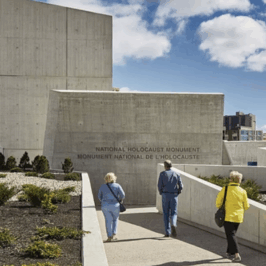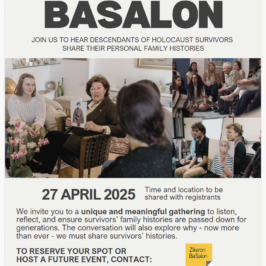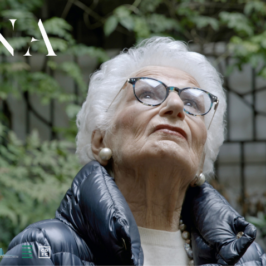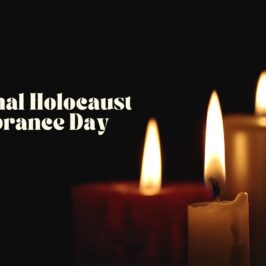By Mina Cohn and Kara Goodwin
Centre for Holocaust Education and Scholarship (CHES)
Class may be back in session, but Jewish organizations continue to learn a hard lesson about rising antisemitism in Canada.
Our schools, like other public institutions, have seen an increase in anti-Jewish hate, misinformation, and since the spring of 2021, increasing anti-Zionist rhetoric. While the world has become “woke” and sensitive to many human rights issues, it turns a blind eye to antisemitism, one of the oldest forms of hate.
Diversity and equity programs at many school boards fail to recognize antisemitism officially, and Canada, along with the rest of the world, is facing a threatening rise of extremist hate groups, antisemitism, and racism, combined with misinformation and fake news on social media.
Our youth, our communities, and our connections are suffering as a result. The fact that our classrooms, public institutions such as libraries, and places of work are now contradictorily both diversity aware and increasingly tolerant of antisemitism is more than troubling. Jewish youth continue to feel attacked and alone as many of their teachers not only lack an understanding of antisemitism but are fearful of addressing the issue. Jewish parents and educators across the country report a growing number of antisemitic incidents in public schools, causing significant anxiety and fear amongst community members.
As troubling as this is, should we be entirely surprised? We’ve seen a remarkable lack of awareness of Jewish experience in the media and gaffes by public figures and politicians. A 2018 Claims Conference survey told us that 66 percent of millennials could not identify what Auschwitz was, while 22 percent were unfamiliar with the Holocaust. In Canada, Grade 10 History curriculum may or may not cover the Holocaust, depending on the teacher.
A 2020 Azrieli Foundation Survey pointed out that only 37% of teachers felt confident teaching the Holocaust. Contrast this apathy with concrete measures some school boards have taken on parallel human rights issues.
In 2021, the Peel District School Board passed a motion to adopt an anti-Islamophobia strategy. The motion, brought forth by a trustee, includes mandatory training for all district teachers on identifying Islamophobia, reviewing teaching materials and curriculum, and promoting a culturally sensitive environment for students. What if such a strategy was applied to Jews and other diverse groups?
According to Statistics Canada (August 2022), Jewish Canadians remain the religious minority most targeted by hate crimes. For a society to be free of racism, an ongoing commitment to its eradication through education is essential. Learning about the origin of prejudice helps students to think critically about antisemitism today. Holocaust education is an excellent tool for teaching students how to fight antisemitism, racism, and intolerance. It builds empathy and good citizenship by helping young people to understand the inestimable value of a free society.
In the absence of a national strategy on antisemitism that aligns Jewish community partners in advocacy, education, and reporting, Jewish organizations are taking steps locally.
In Ottawa, the Canadian Centre for Holocaust Education and Scholarship (CHES) developed Unpacking Complexity in the Classroom which provided training to the local school board in spring 2022. The initial seminar helped educators to recognize and define modern antisemitism and provided tools and strategies to deal with sensitive issues in the classroom and with administration.
We are deeply aware of the power of education to divide or unite people. It is our firm belief that coordination and cooperation between Jewish organizations is essential to effectively address antisemitism and the need to strengthen Holocaust education in our city, province, and country.
Canada’s many Jewish organizations and centres that focus on the Holocaust and antisemitism possess an immense amount of experience, knowledge, and contacts countrywide. Regrettably, each organization continues to work on its own, weakening the opportunity to affect real change.
To strengthen our point, uniting behind the urgency to address the increase in prejudice and antisemitism across Canada must happen. Jewish communities across Canada need to understand that their voices will be stronger and more effective if they work together. CHES will continue to advocate for a united approach.
In the absence of a national strategy on antisemitism that aligns Jewish community partners in advocacy, education, and reporting, Jewish organizations are taking steps locally.
In Ottawa, the Canadian Centre for Holocaust Education and Scholarship (CHES) developed Unpacking Complexity in the Classroom which provided training to the local school board in spring 2022. The initial seminar helped educators to recognize and define modern antisemitism and provided tools and strategies to deal with sensitive issues in the classroom and with administration.
We are deeply aware of the power of education to divide or unite people. It is our firm belief that coordination and cooperation between Jewish organizations is essential to effectively address antisemitism and the need to strengthen Holocaust education in our city, province, and country.
Canada’s many Jewish organizations and centres that focus on the Holocaust and antisemitism possess an immense amount of experience, knowledge, and contacts countrywide. Regrettably, each organization continues to work on its own, weakening the opportunity to affect real change.
To strengthen our point, uniting behind the urgency to address the increase in prejudice and antisemitism across Canada must happen. Jewish communities across Canada need to understand that their voices will be stronger and more effective if they work together. CHES will continue to advocate for a united approach.






